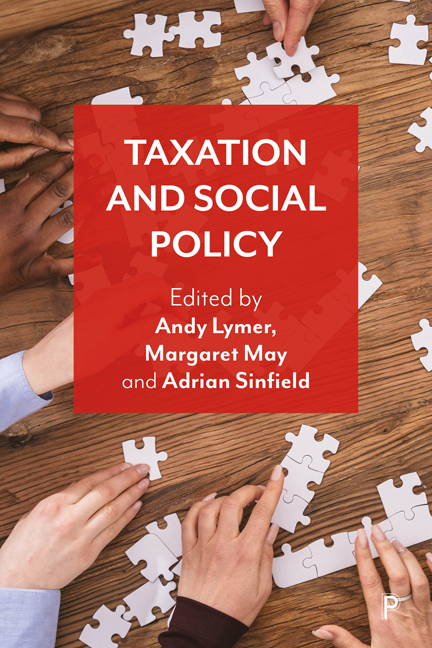Book contents
- Frontmatter
- Contents
- List of figures and tables
- List of abbreviations
- Notes on contributors
- Acknowledgements
- 1 Introduction: The case for considering taxation and social policy togethe
- 2 Fiscal and social policy: two sides of the same coin
- 3 Tax and the social policy landscape
- 4 Fiscal welfare and tax expenditures
- 5 Employment, self-employment and taxation
- 6 Pensions and taxation
- 7 Tax, benefits and household income
- 8 Taxation, health and social care
- 9 Homes, housing and taxation
- 10 Wealth taxation: the case for reform
- 11 Gender and taxation
- 12 Taxation and local taxes
- 13 Corporate tax and corporate welfare
- 14 The climate crisis and taxation
- 15 Conclusions: Taxation in a social policy context
- Index
7 - Tax, benefits and household income
Published online by Cambridge University Press: 20 January 2024
- Frontmatter
- Contents
- List of figures and tables
- List of abbreviations
- Notes on contributors
- Acknowledgements
- 1 Introduction: The case for considering taxation and social policy togethe
- 2 Fiscal and social policy: two sides of the same coin
- 3 Tax and the social policy landscape
- 4 Fiscal welfare and tax expenditures
- 5 Employment, self-employment and taxation
- 6 Pensions and taxation
- 7 Tax, benefits and household income
- 8 Taxation, health and social care
- 9 Homes, housing and taxation
- 10 Wealth taxation: the case for reform
- 11 Gender and taxation
- 12 Taxation and local taxes
- 13 Corporate tax and corporate welfare
- 14 The climate crisis and taxation
- 15 Conclusions: Taxation in a social policy context
- Index
Summary
Introduction
Household incomes depend primarily on rewards from the labour market and the ways in which the state intervenes to affect the link between gross earnings and final incomes and the prices of goods that may be consumed. This set of government interventions includes the direct tax system (principally income tax and National Insurance contributions [NICs] in the UK), indirect taxes such as value added tax (VAT) and specific duties on products like petrol, plus the system of welfare benefits paid to people, particularly the state retirement pension for those over the requisite age (currently 66, but rising for younger cohorts), Universal Credit as a means-tested benefit for those of working age and many other remaining contributory and other benefits. The existence of taxes and benefits may also affect people's incentives to work (or to generate income in other ways, such as through the return on savings) and the amount of time they work – although the links between taxes, benefits and behaviour has long been controversial (for example, see discussion in Deacon and Bradshaw, 1983 or indeed in Sandford et al, 1980).
For much of the post-war period, the design of benefits was based on the contributory system of Beveridge (1942), with money paid in via NI and paid out in times of interruptions to work. In more recent times, the emphasis has shifted towards means-tested benefits, and particularly for those of working age rather than those in retirement. This policy shift was seen in wage supplements, Family Income Supplement (introduced in 1970) and Family Credit (from 1986), before increasingly wide-scale tax credits were introduced under New Labour (in office 1997– 2010). More recently, a new system known as Universal Credit has subsumed most of the income-replacement benefits for non-disabled people of working age, which previously were different for those in work compared to non-workers. However, the key concerns about means-testing have not gone away, including lower take-up (not all eligible people will claim them), and potential changes affecting the incentives for self-provision (for example, savings, or extra hours of work, or relying on family members for assistance). This chapter complements the analysis in the first two chapters of this collection.
- Type
- Chapter
- Information
- Taxation and Social Policy , pp. 108 - 127Publisher: Bristol University PressPrint publication year: 2023



